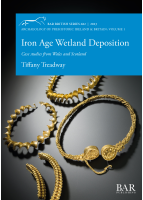Description
The practice of wetland deposition in prehistoric periods is vital for understanding socio-cultural traditions, localised behaviours, and beliefs. Terrestrial deposition has dominated much of the deposition theory, with the importance of wetland deposition recognised only episodically. This study aims to demonstrate wetland deposition's significance and dynamic functions during the British Iron Age, comparing case studies in Wales and Scotland. Through this, it is shown that deposition practices in these regions reaffirmed social and cultural identity, tradition, and collective memory through establishing and evolving mnemonics, while simultaneously performing in a functional and traditional capacity. While wetlands have historically been considered environments denoting separation and isolation, the archaeological evidence is contradictory. Wetlands and wetland environments are, instead, centres of socio-cultural practice and sustainability, especially during civil unrest and economic instability.
AUTHOR
Tiffany Treadway received her BA in Anthropology from the University of California, Santa Barbara. She completed her Masters and PhD in Archaeology at Cardiff University, and is currently working as Collections and Exhibitions Officer at Pontypridd Museum.
REVIEW
‘An essential springboard for the next generation of research.’ Professor Dennis Harding, University of Edinburgh
‘An original, substantive and deeply methodical investigation of Iron Age depositional practices in Scotland and Wales, it will be required reading for anyone trying to understand the “strangeness” of Iron Age societies and their practices in Britain, and to properly grasp and interpret the evidence they have left us.’ Professor Aidan O’Sullivan, University College Dublin











